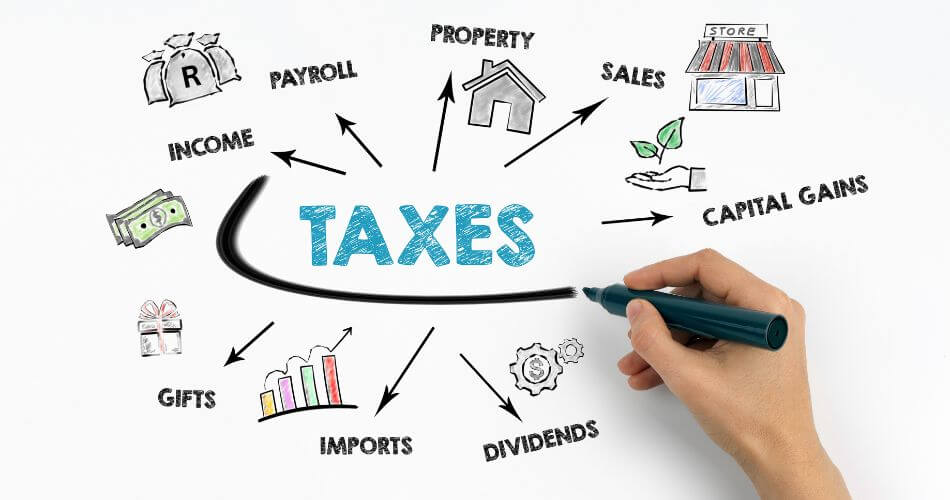Understanding Property Taxes in South Africa
Maximize Your Property Investment: A Complete Guide to South African Property Taxes

Owning property in South Africa involves navigating a complex landscape of taxes that can significantly impact your financial planning.
Whether you’re purchasing a home for personal use or as a business investment, understanding the various taxes at different stages of ownership is crucial.
Let’s explore the tax obligations South African homeowners face and how to plan your property investments wisely.
Taxes at the Time of Purchase

VAT vs. Transfer Duty: What’s the Difference?
When you buy a property, you’ll either pay Value Added Tax (VAT) or transfer duty, but not both.
VAT on New Developments
VAT is applicable when buying a new residential property from a VAT-registered business, typically involving new developments. The good news is that VAT is included in the purchase price, meaning your home loan will cover this expense.
This arrangement can be advantageous for first-time buyers, making new properties financially attractive.
Transfer Duty on Existing Properties
In contrast, transfer duty applies when purchasing an existing property from its current owner. Unlike VAT, transfer duty is not included in the purchase price and usually must be paid out-of-pocket. For higher-priced properties, this can be a significant expense.
For example, if you’re buying a property priced at R2 million, the transfer duty would be R41,625. This amount needs to be carefully planned for, as it cannot typically be financed through a home loan.
Comparison of Costs
New properties often appear cheaper at the same advertised price due to the inclusion of VAT in the purchase price. This factor should be a key consideration for buyers looking to minimize upfront costs.
Financial Planning for Transfer Duty

It’s essential to plan for transfer duty when purchasing an existing property. Ensure you have funds available to cover this cost to avoid financial strain.
For instance, if you’re buying a property priced at R2 million, the transfer duty could be around R41,625, a substantial amount that needs careful planning.
Additional Costs to Consider
When purchasing a property, several additional costs come into play. For a property priced at R2 million, these might include:
Bond registration costs (incl. VAT): R49,439
Bank initiation fee (incl. VAT): R6,038
Deeds office fees: R1,544
Post, petties, FICA, and other fees (incl. VAT): R2,200
Being accountable for these expenses in your financial planning is crucial to ensure a smooth transaction.
Municipal Taxes Upon Taking Ownership
What Are Municipal Taxes?
Municipal taxes are paid to local municipalities to fund essential city services, infrastructure, and salaries. These taxes are a regular financial obligation once you take ownership of the property.
Impact on Monthly Cash Flow
Municipal taxes are separate from the initial transfer duty or VAT paid to SARS and are in addition to utility charges such as water, electricity, and any levies payable to body corporates or homeowners’ associations.
Factoring these ongoing costs into your monthly budget is crucial, as they can significantly affect your cash flow.
Unexpected Expenses
Many new homeowners are surprised by the monthly municipal tax bill that arrives shortly after taking ownership.
Being unprepared for these expenses can strain your finances, making it essential to include them in your property investment planning.
Capital Gains Tax When Selling Property

Explanation of CGT
Capital Gains Tax (CGT) is a tax on the profit realized from selling a property. It’s calculated as the difference between the purchase price and the selling price, with 40% of this profit taxed at your marginal tax rate.
Primary Residence Allowance
If the property you’re selling is your primary residence, the first R2 million of your profit is exempt from CGT.
However, certain conditions apply:
Mixed-Use Property: If you initially rented out the property and later moved in, the R2 million allowance must be divided proportionately between the rental period and the period you lived there.
Home Office Deductions: If you’ve claimed a deduction for part of the property used for business, this portion must be subtracted from the allowance.
Tax Implications for Trusts and Companies
Trusts and companies pay tax on 80% of their capital gains and do not benefit from the primary residence exemption.
Owning your primary residence through an entity might not be advantageous due to the lack of primary residence relief and potential estate duty implications.
Estate Duty and Property Disposal
Overview of Estate Duty
Estate duty is payable on the value of your estate above R3.5 million when your estate is executed. Any property disposed of during this time will attract CGT, and the same R2 million exemption for your primary residence applies.
If your estate lacks sufficient funds to cover debts or tax obligations, the property may be sold to raise the necessary cash.
Strategies to Mitigate Estate Duty
Several strategies can protect your property from estate tax liabilities:
Life Insurance: Taking out additional life insurance can cover potential tax liabilities.
Estate Planning Vehicles: Selling your property to a trust or company can limit future tax liabilities.
Although you’ll pay CGT on the sale, any future property value increases will be held by the entity, not your personal estate, thereby escaping increasing estate taxes.
Provisional Tax on Rental Income

What is Provisional Tax?
Provisional tax involves estimating your non-employment income for the year and paying tax in two installments: one at the end of August and the other at the end of February.
Any provisional tax paid during the year is deducted from your assessed tax when you declare your total annual income.
Professional Advice for Managing Provisional Tax
Estimating rental income can be challenging, often necessitating professional tax advice. Accurate income estimation ensures compliance with SARS regulations and optimizes your tax strategy.
Conclusion – Understanding the complexities of property taxes in South Africa is essential for effective financial planning and property investment.
From the initial purchase to ongoing municipal taxes and eventual capital gains tax, each stage presents unique challenges and opportunities.
Consulting with a professional tax advisor can help you navigate these complexities, ensuring compliance and optimizing your financial strategy.
By grasping these concepts and planning accordingly, you can confidently manage your property investments and achieve your financial goals. Ready to dive deeper into property investments?
Subscribe to our newsletter for exclusive insights and expert advice from Andre Swart!
Disclaimer: The information provided in this article is intended for general informational purposes only and should not be considered as professional advice.
We cannot accept any liability for any errors or omissions, nor for any loss or damage resulting from reliance on this information. Always consult with your professional adviser for specific and detailed advice tailored to your situation.
